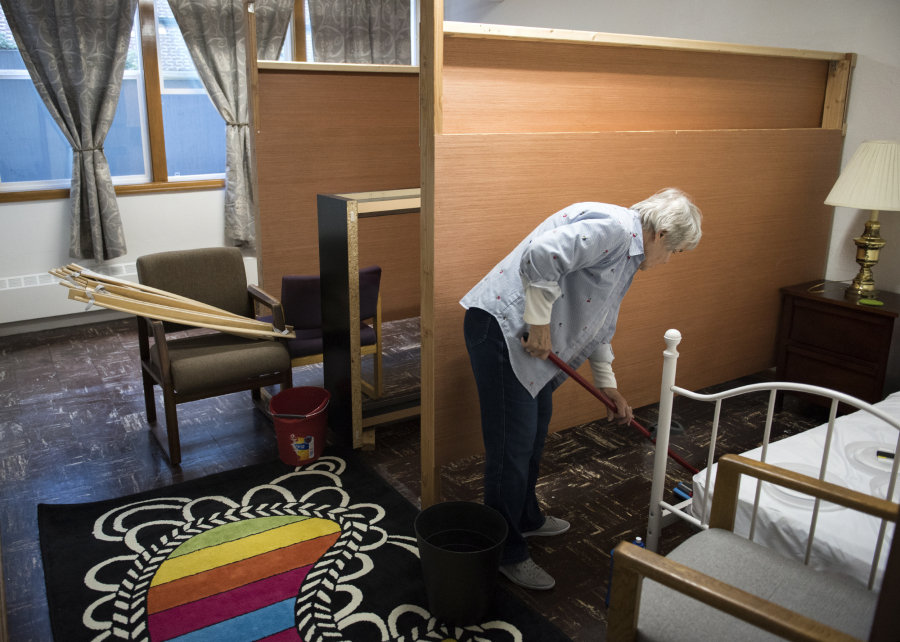This week, there will be a lot more homeless shelter spaces than last week. That’s because seasonal shelters are opening and a yearlong shelter for women found a permanent home at a west Vancouver church. Other churches are gearing up to provide additional capacity on icy or snowy days.
Wednesday is the first night of the Winter Hospitality Overflow, or WHO, program that for the last 15 years has added 99 shelter spaces to the community between November and March.
“To me, it’s still a miracle that it works,” said the Rev. Jim Stender, pastor at St. Andrew Lutheran Church, which hosts a WHO shelter. “We need to have between 1,300 and 1,500 volunteers to pull this off. … I think it shows the heart of the community.”
Although paid case workers connect with clients in the evening, the shelters at St. Andrew in Orchards and St. Paul Lutheran Church downtown are staffed overnight by volunteers from churches and other groups. St. Andrew houses families and single women with space for up to 50, while St. Paul houses up to 24 men.
You Can Help
• Women’s Housing and Transition (WHAT) is looking for donations of new and gently used twin mattresses, twin bed frames, rugs, bedside tables and lamps, and gift cards to Fred Meyer, Lowe’s or Home Depot. Call St. Luke’s Episcopal Church at 360-696-0181 to arrange a donation.
• Individuals, groups or faith communities interested in volunteering at a Winter Hospitality Overflow (WHO) shelter can contact program coordinators at 360-200-8757 or whoprogram@gmail.com.
• To contribute financially to the WHO program, make a donation to the Council for the Homeless at www.councilforthehomeless.org and note in the comments that it’s for the WHO program. Otherwise, checks can be mailed to the Council for the Homeless, 2500 Main St., Vancouver, Wash. 98660.
• Immanuel Lutheran Church is seeking volunteers to staff its emergency winter shelter, which would open during severe weather. The church could also use packets of instant foods, such as oatmeal and noodles, and other snacks. Contact the church at 360-694-3661 or office@immanuelvancouver.org.
Stender said internal changes have better organized the program, which is now overseen by a group of volunteer coordinators.
“There’s been a tremendous amount of prep work,” he said.
Lori Lemley is one of those coordinators. She said a concern this year is that a major fundraiser for the WHO isn’t happening, so the program could benefit from a financial boost. The 2018 budget for WHO is about $40,000.
On Friday, there were 22 single men interested in staying at St. Paul and 33 people (nine families) interested in staying at St. Andrew, according to the Council for the Homeless, which fields all requests for shelter through its Housing Hotline.
Women’s shelter
Today, two days before the WHO opens, a yearlong 18-bed overnight shelter for women opens at St. Luke’s Episcopal Church. Women’s Housing and Transition, also called WHAT, has alternated between locations at St. Luke’s and St. Paul.
It used to be a 12-person shelter, but St. Luke’s set up two more rooms in its basement to accommodate six more people. The shelter could eventually be open 24/7, which would be the first shelter expansion of its kind in more than two decades in Clark County, said Amy Reynolds, the deputy director of Share.
The nonprofit staffs WHAT with part-time case workers and rents the space from St. Luke’s; the total cost to run WHAT is $200,000 annually. If the shelter were to be open 24/7, Share would need to hire more people, so the nonprofit is talking about getting funding for that. Not requiring people to leave during the day would be a costly change.
WHAT has a lower client-to-staff ratio so it can serve women with higher needs, such as physical disabilities or mental health issues, Reynolds said. Since the start of the year, 38 women have used WHAT. Many have moved onto transitional housing or treatment programs.
Weather worries
Last year’s harsh winter caught people off guard, revealing a lack of capacity and planning when it comes to emergency shelters that open when the weather’s particularly bad. Agencies and grass-root groups that serve homeless people began meeting in the summer to improve that response system.
One improvement that’s coming to fruition is more places that would open in the event of severe weather: freezing rain, snow or temperatures below freezing. Last year, there were 54 severe weather days.
So far, Living Hope Church is on board again. On its busiest night the church off Andresen Road hosted 137 people. It was a low-barrier shelter, meaning people didn’t have to take a Breathalyzer test before entering.
A majority of the congregation at Immanuel Lutheran Church in the Vancouver Heights neighborhood recently voted to become an emergency shelter. Church member Shiela Osheroff started attending the shelter system meetings at which people said her centrally-located church could make a good site.
Immanuel Lutheran is working with the Council for the Homeless to get up and running. The emergency shelter may host about 25 people.
Osheroff said there are a variety of efforts in progress. Immanuel is exploring purchasing sleeping mats, as is another church that’s considering becoming a shelter. The Vancouver Fire Marshal’s Office still has to inspect the place, volunteers still have to be recruited and trained. There’s also the matter of gathering snacks and quick breakfast items; there’s no commercial kitchen.
“Little by little, the pieces are getting together,” Osheroff said. “It’s a bare bones operation.”
The congregation also committed to volunteering three weeks at a WHO shelter.
Other faith groups are in the process of deciding whether or not they can host people during severe weather, said Kate Budd, deputy director of the Council for the Homeless. It basically means being on call. Nonprofits Food with Friends and Concerned Humans Against Poverty offered to help churches with volunteer coordination.
They would open when all the other shelters are at capacity. If WHO is overflow for the regular, year-round shelter system, then these emergency facilities are overflow shelters for the overflow shelters.
Contact
• To access Winter Hospitality Overflow (WHO) shelters or any other kind of winter shelter call the Housing Hotline at 360-695-9677.
By the numbers
Winter Hospitality Overflow (WHO):
•St. Andrew Lutheran Church: 6,649 bed nights, 297 people
•St. Paul Lutheran Church: 3,296 bed nights, 75 people




